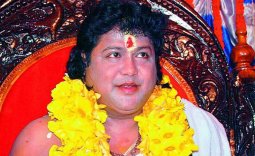 NEW DELHI: ‘Firaq’ – one of the greatest names in Urdu literature in India – once admonished a stray dog who happened to be sleeping on a sofa at his Bank Road house in Allahabad when a friend came visiting.
NEW DELHI: ‘Firaq’ – one of the greatest names in Urdu literature in India – once admonished a stray dog who happened to be sleeping on a sofa at his Bank Road house in Allahabad when a friend came visiting.
“Ghar mein mehmaan aaye hain aur aap so rahe hain! Jaaiye andar jaake let jaaiye.” (A guest has come to the house and look at you, sunk in slothful slumber/ Take yourself inside and lie down there.)
The friend, like others who heard this tale, was left amused at the way the literary stalwart – known for his eccentricities and bohemian nature – reacted on seeing the canine up on his couch.
Born on August 28, 1896, Raghupati Sahai ‘Firaq Gorakhpuri’ was also one of the most colorful men to have walked through the portals of Allahabad University – both as a student as well as a teacher – a character of rare and scathing repartee, with enormous potential to shock and awe middle-class morality, according to a new Rupa Publications book “Three Rivers and a Tree – the story of Allahabad University”.
Born in Gorakhpur to Munshi Gorakh Prasad, Firaq’s mother was third of his wives, the other two having passed away. He was one of the eight siblings, five brothers and three sisters.
After passing out of the Gorakhpur Government Jubilee High School in 1913, he joined the Muir Central College in Allahabad, for an MA and later was selected for the Indian Civil Services.
The known maverick, chose to quit government service and plunged into the national movement, that landed him an 18-month jail sentence in 1920.
Thereafter an old acquaintance of his – Jawaharlal Nehru – got him into the All India Congress Committee as its inter-secretary on a salary of Rs 250 a month and where he worked from 1923 to 1928.
In 1930 Firaq was appointed a lecturer in the Allahabad University’s English Department where he continued till his retirement in 1958.
His presence has been described by one of his colleagues –
Harivansh Rai Bachchan – as “the most colorful” in that department.
Firaq Saheb’s bohemian life has come in for much storytelling, as has is off beat appearance: hair disheveled, a cigarette in one hand a stick in the other, an unbuttoned sherwani, loose pajamas with long, dangling drawstring, smoldering eyes and wild look.
He was fond of country liquor, which he poured out of a spouted vessel and it was the same man who in 1961 was given the Sahitya Akademi Award for his book “Gul-e-Nagma” and was made professor emeritus till 1962. In 1967 he was awarded the Padma Bhushan, in 1968 the Soviet Land Nehru award and in 1970 the Jnanpith award.
Author Neelum Saran Gaur writes about a rarely told tragic comic tale about an old student of Firaq who was regularly asked by the poet to write news reports to say that the great poet Firaq was terminally ill and dying.
The reports, says Gaur were dropped off by the student at the United News of India (UNI) office, to be carried by newspapers in Bihar, particularly in the one named ‘Searchlight’.
“This mysterious ruse was aimed at Firaq Sahib’s Bihari sons-in-law who subscribed to the paper and who might, he hoped, on reading them, send some money for their (perfectly healthy) father-in-law. For Firaq did actually have two daughters, married into the same family in Bihar.
“Firaq as a family man is the lesser known chapter. The lonely wildly bohemian image is more in keeping with the perverse-genius persona he wore,” writes Gaur.
Despite honors and accolades, his waning years were far from financially comfortable. Firaq’s various moneymaking schemes would be ridiculous and amusing, were they not so unfortunate, recounts Gaur.
“Firaq tried his hand at running a grocery store, co-owning a publishing house, keeping hens in an experimental domestic poultry farm and is even said to have had plans for starting a pig-keeping business! This final element in this fable only serves to do what is entire personality so effectively did all his life – leave his audience at a loss for words,” says the book.
An oeuvre of stories – some real and a great many apocryphal –
continue to do the rounds in the literary and academic circles about ‘Shair-e-Azam’ Firaq – credited with having created a special identity for himself. ‘Poet, critic, fiction writer, translator, conversationalist and widely regarded as one of the greatest Urdu men of letters.’
“Paradoxically, there was a current of aggrieved dissatisfaction, loss and loneliness, which were both real and classic.” Regarding Firaq Saahib’s public posturing of this tragic aspect, it is easy to assign some responsibility to his quixotic nature, his own accounts being both self-valorizing and creatively memorable. After noisy evenings at the Coffee House, holding forth on a range of subjects, from existential angst to the prissiness of Hindi poetry – his audience speechless – Firaq Sahib went home to a solitary bohemian night.
“Hiring a rickshaw, he would pick up a clutch of loaves, something to eat from a roadside eatery in Katra that sold mutton and roti, his supply of country liquor, and revert to the plane of which one of his best known verses sings: ‘Koi charaagh jalao, kuchh raat kate’ (Light a lamp, someone, that some of this night may pass).
Firaq died on March 3, 1982, in Delhi.–PTI






